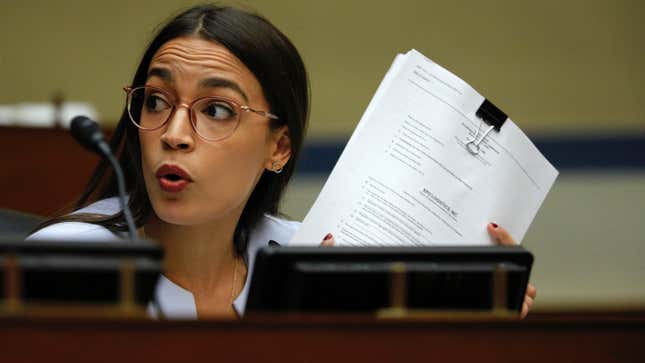
The dust hasn’t even settled on the 2020 election (stares intently at Georgia’s two Senate runoffs), but the sniping has already begun. Establishment House Democrats who have either spent decades in Congress or ran as conservative Democrats spent the end of last week blaming progressives for the party running behind President-elect Joe Biden.
But it’s not clear at all that progressive policy is the culprit in Democrats losing seats in the House. With the caveat that more 2020 election data will still come out, Earther dove into the last week’s results and looked specifically at the Green New Deal’s impact on races across the country. Simply put, the Green New Deal is not a political loser.
The fight over the role of progressives in sinking (or not) Democrats’ chance at a robust unified government began late last week in a call leaked to Politico. On that call, Rep. Abigail Spanberger claimed she almost lost her race in Virginia because she was accused of wanting to defund the police (she does not). House Majority Whip Jim Clyburn reportedly said, “we are going to run on Medicare for All, defund the police, socialized medicine, we’re not going to win.” That’s led some progressives to push back; notably, New York Rep. Alexandria Ocasio-Cortez, who pointed out every co-sponsor of Medicare for All won reelection and that Democrats are still running like its 2000 instead of 2020.
Earther looked at the Green New Deal, another bête noire of conservatives and Fox News, to see if it sank Democrats chances. The bill has 101 co-sponsors in the House and 14 co-sponsors in the Senate. Of the 93 House co-sponsors who ran for a seat in Congress’s lower chamber in 2020, only one lost reelection.
Using Cook Political Report’s Partisan Voting Index, Earther found four House co-sponsors who are in districts that range from very slightly Democratic to moderately Republican. Of those four, three decisively won their reelection bids, including Reps. Mike Levin, Jahana Hayes, and Peter DeFazio. The fourth, Rep. Tom Suozzi, is currently behind in his race in New York by about 4,000 votes, but is projected to “easily win” once all mail-in ballots are counted, according to Cook Political Report’s Dave Wasserman.
Outside of Suozzi, the only Green New Deal co-sponsor to lose is Florida Rep. Debbie Murcasell-Powell. She lost what was a moderately Democratic-leaning seat, though it was previously represented by Rep. Carlos Curbelo, arguably the most outspoken Republican on climate change prior to losing the seat in 2018 to Murcasell-Powell.
This is quick-and-dirty analysis aligns with other data showing that representatives who have sponsored and voted for progressive policies were not punished by voters. An analysis commissioned by the Sunrise Movement and Justice Democrats and shared with Intercept Washington, DC, bureau chief Ryan Grim shows that Democratic House candidates in more liberal swing districts won by greater margins than more conservative ones.
Basically, the people who actually back progressive policies came through the election largely unscathed and, in many cases, fared better than their more conservative Democratic counterparts in swing districts. And lest we forget, Kamala Harris, one of the Senate co-sponsors of the Green New Deal, is now vice president-elect. To be fair, there were also high-profile examples of progressive Democrats running on a Green New Deal failing to pry swing-ish districts out of Republican hands, notably the Texas race between organizer Mike Siegel and Rep. Mike McCaul, and a post-mortem on that race is certainly something to watch out for.
One thing we shouldn’t lose sight of in this discussion of the politics of the Green New Deal is the physics of the climate. The Green New Deal is a policy designed to keep planetary heating to levels humanity can deal with. No other plan put forward so far, including President-elect Biden’s, is enough to meet the scale of what’s needed to stabilize the climate at a safe level. The costs of inaction or not enough action are staggering, and yet Democrats have failed to make those stakes clear (ditto for much of the media as well, but that’s a whole other thing).
The fight against progressives may just be political posturing because, as Grim notes, the shrunken majority means that a handful of Democrats who come together can now wield immense power in the House. And with reinforcements coming to join the Squad thanks to progressives like Jamaal Bowman, Cori Bush, Marie Newman who ousted incumbents as well as Mondaire Jones who won a seat where Rep. Nita Lowey retired, this could all be jockeying for position. It may also just obstinate refusal to acknowledge the rot inside the Democratic Party. But for all the complaining about progressive policies sinking Democrats chances of expanding their hold on the House and overtaking the Senate, the data available so far just is not there.
Update, 11/9/2020, 12:54 p.m.: After this story published, Cook Political Report’s Dave Wasserman projected Rep. Tom Suozzi will win his race once mail-in ballots are counted, meaning Green New Deal co-sponsors in close Partisan Voting Index seats went four for four. This piece has been updated to reflect that.